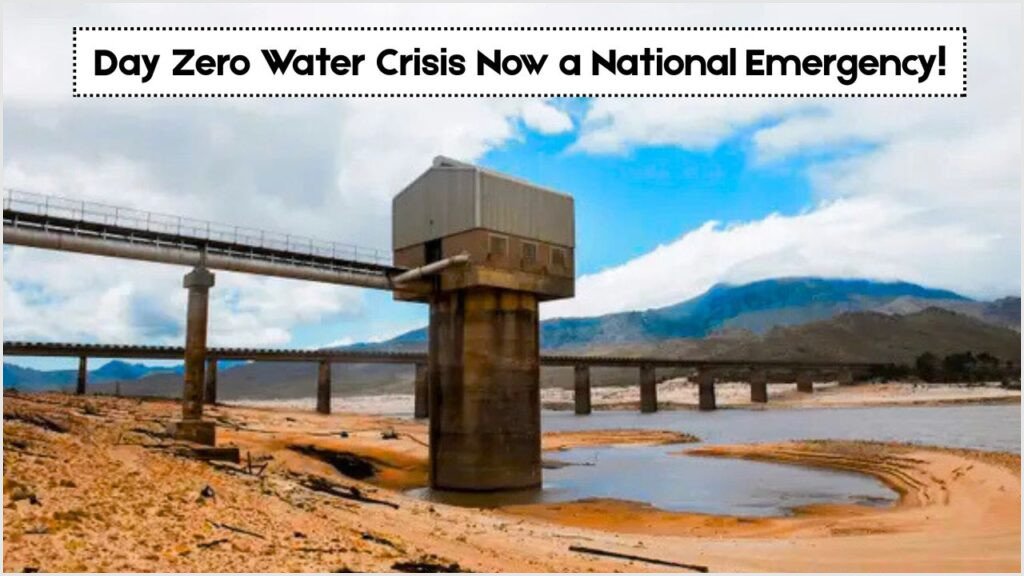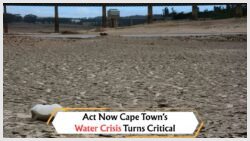Cape Town Dam Drops – Cape Town is on the brink of a severe water disaster as dam levels have plummeted to a critical 34.8% in August 2025. This alarming figure has pushed the government to declare a national emergency, with “Day Zero” warnings now back in the headlines. For residents of the Western Cape, the echoes of the 2018 water crisis are returning — only this time, the scale and urgency are much worse. What makes this situation particularly dangerous is not just the low dam level, but the speed at which water reserves are being depleted. Authorities fear that without drastic reduction in water consumption, Cape Town could run out of usable water within weeks. Municipalities have already started rationing water, and emergency response teams have been deployed to manage bulk water transportation and borehole activation. The decline has been attributed to a combination of low rainfall, rising temperatures, increased consumption, and infrastructure challenges. The impact is expected to ripple across sectors — from agriculture to tourism — while vulnerable communities bear the brunt of limited water access. National and provincial departments are urging all residents and businesses to cut usage immediately, while introducing new restrictions effective from August 10, 2025.
Dam Levels Across the Western Cape Plunge to Dangerous Lows
The latest dam level figures present a stark picture of water availability across the region. Here’s a snapshot of the current dam status:
- Dam levels have fallen sharply in the last 30 days
- Cape Town’s major supply dams now average just 34.8%
- Storage capacity has dropped by 15% compared to July
- Daily consumption exceeds safe withdrawal limits
- Rainfall in 2025 is 40% lower than the 10-year average
Current Western Cape Dam Statistics (August 2025)
| Dam Name | Capacity (%) | July Level (%) | August Level (%) | Change (%) | Last Year Same Time (%) | Usage Priority | Risk Level |
|---|---|---|---|---|---|---|---|
| Theewaterskloof Dam | 38.2% | 52.5% | 38.2% | -14.3% | 60.1% | Drinking, Agriculture | Severe |
| Voëlvlei Dam | 36.4% | 50.2% | 36.4% | -13.8% | 58.6% | Drinking Supply | Critical |
| Berg River Dam | 41.9% | 55.7% | 41.9% | -13.8% | 63.2% | Residential & Agri | Severe |
| Wemmershoek Dam | 33.7% | 47.0% | 33.7% | -13.3% | 56.1% | Municipal | High |
| Steenbras Lower Dam | 31.1% | 46.2% | 31.1% | -15.1% | 54.8% | Industrial | Critical |
| Steenbras Upper Dam | 29.6% | 44.5% | 29.6% | -14.9% | 52.7% | Emergency Use | Critical |
| Clanwilliam Dam | 40.5% | 53.9% | 40.5% | -13.4% | 61.0% | Agricultural | Severe |
| Misverstand Dam | 42.3% | 56.2% | 42.3% | -13.9% | 62.8% | Supplementary Supply | Moderate |
National Emergency Declared – What It Means for Residents
South Africa’s Department of Water and Sanitation (DWS) has declared a National Emergency to ensure coordinated disaster management. Here’s what this means:
- Water rations of 50 litres per person per day in Cape Town enforced from August 12
- Emergency water tankers being deployed to informal settlements
- Limitations on car washing, pool filling, and garden irrigation
- Hospitals and schools prioritized for municipal water supply
- Increased groundwater extraction and borehole drilling underway
Emergency Measures Rolled Out by Authorities
| Intervention | Responsible Department | Start Date | Scope of Action | Area Coverage | Status | Target Beneficiaries |
|---|---|---|---|---|---|---|
| Mobile Water Tankers | Cape Town Municipality | Aug 12, 2025 | Deliver water to critical zones | Informal settlements | Active | 250,000 residents |
| Borehole Activation | Dept. of Water & Sanitation | Ongoing | Reactivate & drill new boreholes | Western Cape | In Progress | Rural & peri-urban users |
| Public Awareness Drive | National Disaster Management | Aug 5, 2025 | Educate public on water-saving tips | All provinces | Live | General public |
| Military Water Reserves | SANDF | Aug 15, 2025 | Emergency water supply support | Cape Town & surrounds | Planned | Hospitals & clinics |
| Agricultural Allocations | Dept. of Agriculture | Aug 18, 2025 | Cut water allocation to farms | Western Cape farms | Pending | Reallocation to urban users |
Harsher Restrictions Introduced by City of Cape Town
City officials have announced an updated set of restrictions to slow water consumption and avoid Day Zero. Residents found violating these rules may face hefty penalties and water throttling.
- No hosepipe use allowed, even with a nozzle
- All decorative fountains to be shut down
- Pools must be covered and may not be topped up
- Businesses to submit monthly water usage reports
- New building plans must include greywater systems
Impact on Day-to-Day Life for Citizens
The new restrictions will deeply affect how residents live and work:
- Families must recycle and reuse household water
- Cooking and cleaning routines altered to minimize use
- Car washes, laundromats, and salons to reduce operations
- Some businesses face partial closures during peak hours
- Increased costs for bottled water and purification equipment
Provincial Government Steps In with Additional Support
In response to the mounting crisis, the Western Cape Government has allocated emergency funds and activated disaster management plans. Premier Alan Winde emphasized urgency and solidarity.
- R420 million allocated for emergency drought relief
- Schools to install large-capacity water tanks by Sept
- Additional water patrol units deployed for enforcement
- Collaboration with NGOs for community-level outreach
Local Municipalities Implementing Tiered Water Plans
- Level 6B restrictions enforced in metro regions
- Tankering water to small towns facing complete outages
- Community engagement drives in townships and informal areas
- Temporary water stations set up at transport hubs
Long-Term Solutions Being Accelerated to Avoid Future Day Zeros
While current efforts focus on crisis mitigation, long-term investments are being pushed to ensure water security.
Major Projects Under Review and Acceleration
- Desalination Plants: Plans to expand Saldanha Bay and Strandfontein desalination capacity by 2026
- Recycling Facilities: Upgrades to Athlone Wastewater Treatment Plant for potable water reuse
- Catchment Management: Enhanced alien vegetation clearing and runoff preservation
- Digital Metering: Smart meter rollout by 2027 to monitor real-time usage
- Urban Harvesting: Rainwater harvesting mandates in new developments
Challenges to Implementation
- Budget limitations and rising costs of infrastructure
- Slow tender processes and political bureaucracy
- Maintenance backlogs in water delivery systems
- Community resistance due to misinformation or lack of trust
Departmental Contact Information for Water Crisis Queries
Residents, businesses, and stakeholders can reach out to the following departments for assistance, updates, and reporting:
| Department/Agency | Contact Person | Phone Number | Email Address | Services Offered |
|---|---|---|---|---|
| City of Cape Town Water & Sanitation | Mr. F. Jansen | 021 444 2148 | [email protected] | Restrictions info, reporting violations |
| Western Cape Disaster Management | Ms. Nolwazi Sibeko | 021 937 6300 | [email protected] | Emergency response and tankering |
| Dept. of Water and Sanitation (DWS) | Mr. T. Modiba | 012 336 7500 | [email protected] | Borehole registration and water updates |
| National Drought Response Team | Dr. L. Mthembu | 0800 200 200 (Toll-Free) | [email protected] | National-level coordination |
| Agricultural Support Hotline | Ms. J. Du Plessis | 0861 123 456 | [email protected] | Support for farmers and rural water use |
Cape Town’s water crisis is not just a municipal issue — it’s a national emergency that calls for immediate, united action. The time to act is now, and every drop saved brings the city one step closer to averting disaster.
Frequently Asked Questions (FAQs)
Q1: What is Day Zero and when is it expected?
Day Zero refers to the day when taps run dry. Projections estimate this could happen by mid-September if current trends continue.
Q2: Can I still water my garden or fill my pool?
No. All non-essential water usage is banned under current restrictions.
Q3: Are schools and hospitals exempt from restrictions?
They are prioritized for supply but must also follow strict water-saving protocols.
Q4: How can I report illegal water use?
Contact the City of Cape Town Water & Sanitation department via their hotline or email.
Q5: Will water tariffs increase due to the crisis?
Yes. New emergency tariffs will be implemented from August 20 to manage consumption.
How is Cape Town responding to the water crisis at a national emergency level?
By issuing a Day Zero alert as dam levels drop to 34.8%.





